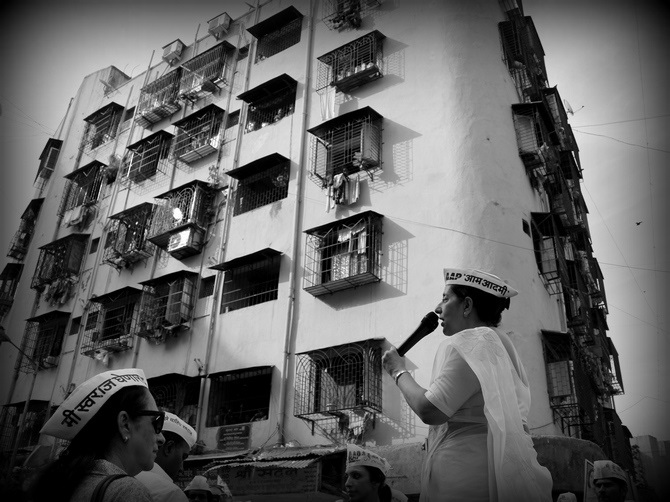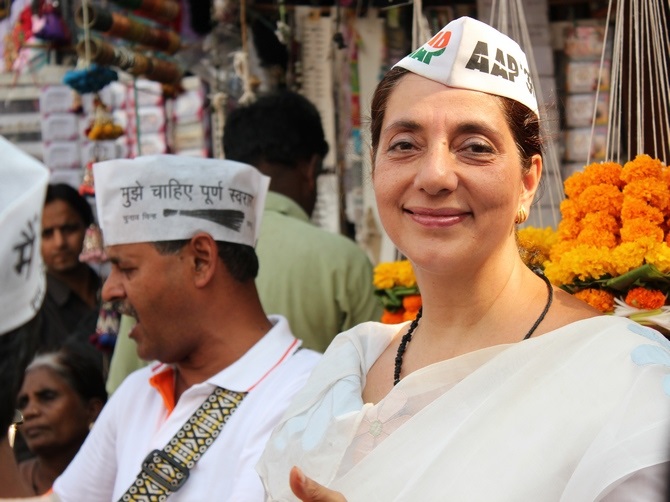 | « Back to article | Print this article |
'We are not a corrupt people... we are hardworking'
What Meera Sanyal has learned from her unsuccessful 2009 Lok Sabha campaign. In her own words.
In 2009 Meera Sanyal took a sabbatical from her job as CEO and chairperson at the Royal Bank of Scotland to contest as an independent candidate for the Mumbai South Lok Sabha seat.
She finished with just about 10,000 votes.
Having lost, she went back to her job, only to relinquish the position in 2013 to run again for public office, this time as a candidate of the Aam Aadmi Party.
Failure, they say, is the best teacher.
So this time, armed with the learnings of her previous campaign, Sanyal was on the streets once again, more optimistic than ever and hoping to beat the two-time MP from her constituency, Milind Deora.
Here are Meera Sanyal’s learnings in her own words:
The big difference from the last time is that I am not running as an independent.
I am part of a political party and that, I realise, helps a great deal.
For one you have the recall value of your party symbol (the broom) and what it is associated with.
The logistics of reaching out to (about) 15 lakh people (there are about 14.8 lakh registered voters in the Mumbai South constituency, incidentally about two lakh registered voters less than the last elections) also become easier when you are part of a political party than as an independent candidate.
As told to Abhishek Mande Bhot. With inputs from Prasanna D Zore
Please click on NEXT to read more…
'We are also better organised this time'
Unlike the last time, when we depended largely on well-wishers and friends, this time we have about 2,000 volunteers helping us in our campaign.
None of these people is paid. They are here out of their own free will to support the party and its campaign.
Meera Sanyal’s husband, Ashish Sanyal, adds:
We are also better organised this time.
This involves attention to small but important things.
The last time, we were carrying around just one loudspeaker. It broke down.
This time we are carrying five.
We also have learnt how to plan our rallies better.
A handful of people lead (the candidate) and distribute pamphlets (and this time the AAP caps).
The group has to be compact and stick together (rather than end up being one long, thin trail).
These were simple but important lessons we learnt from the last time.
Some of our friends, who are advertising professionals, have helped us design the campaign too.
We had also realised advertising on local buses wasn’t having a very strong impact. So we had decided against running a campaign on the buses long before the Election Commission prohibited it.
Meera Sanyal continues:
Last time we were counting on friends to manage poll booths.
This time we have party volunteers to do it.
Yet again, this army of volunteers is an organised bunch.
The job of a polling agent is an important one and these volunteers will be marked on their performance.
Depending on how they perform, the AAP will promote them to members of the mohalla sabha, then an opportunity to run as municipal councillors, MLAs and so on and so forth.
Preeti Sharma Menon, the state secretary of AAP, adds:
Each constituency has roughly 1500 polling booths and for efficient voter management, each booth needs to be manned by at least 10 people.
At best we can gather no more than 2,000 volunteers for each constituency (a good 13,000 short of the ideal figure).
Meera Sanyal continues:
I have travelled the city on foot and have come to realise that unlike what everyone says, we are not a corrupt people (she said she shot down a German journalist who said corruption was in India’s DNA).
We are a hardworking lot.
And though we might come from different socio-economic backgrounds (Mumbai is known for having skyscrapers rising from the midst of slums, chawls standing in the midst of super-expensive commercial districts), our broader issues are similar.
Issues like affordable housing, dealing with corruption, lack of open spaces and overcrowded public transport, cut across socio-economic boundaries.
I do not get into specific issues.
I do not promise people things that I know I won’t be able to fulfill.
I do not, for instance, promise (the underprivileged) taps in people’s homes because really that is supposed to be the job of a municipal councillor and not a member of Parliament.
But I listen to what they have to say, their ideas and their suggestions.
When I go to meet people, there are times when abuses are hurled at me.
I have to ignore and take them in my stride.
That is a new learning too -- having to develop a thicker skin, though I am not quite sure how much I have been able to do it.
The best piece of advice I received about my campaign for these elections came from Hillary (Clinton).
She said: “You are fighting for your ideas; some of your opponents are fighting for their existence.”
I take heart from that.
As told to Abhishek Mande Bhot. With inputs from Prasanna D Zore.

